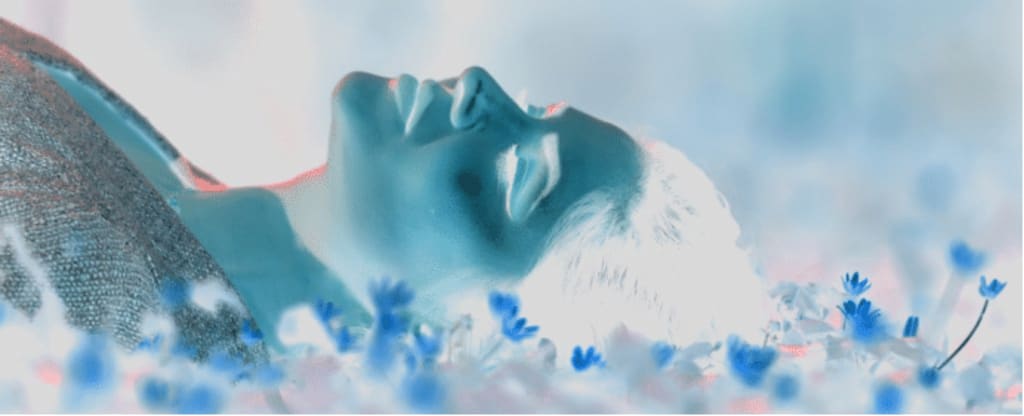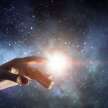After studying 24,000 dreams, scientists came to the conclusion that dreams are indeed a continuation of reality
Are dreams a continuation of reality?

What is a dream? Some people say that dreams are a mirror that peeks into a person's heart, because the content of dreams is the embodiment of the subconscious. Some people say that dreams are another kind of illusory but real life experience. We often see familiar people in our dreams, but experience particularly illusory things. In tribal societies with backward civilization development, dreams are often considered to be the instructions of the gods, or the possession of the devil. There are still people who are willing to believe these claims that sound superstitious now, which has to lead to thinking: what is a dream?
Since ancient times, there has been a big difference in the understanding of dreams between the West and China. The ancient Greek philosopher Plato once said: "Good people dream, bad people do evil." Saints have no delusions and therefore do not dream. But from the perspective of modern psychology, there are many misunderstandings about the interpretation of dreams in ancient China and the West. Whether it is a good person or a bad person, people can dream, even animals can dream.
With the continuous development of science and technology, scientists try to use modern science and technology to analyze dreams. So how are dreams scientifically interpreted? Is there a relationship between reality and dreams?
What is a dream?
Since ancient times, people have tried to explain this problem, but in ancient times, human beings were still very limited in their cognition of physiological phenomena, so they could not see the essence of dreams clearly. Some people see some scenes or characters similar to reality in their dreams, but it is difficult to understand what happened. Therefore, the ancients believed that the things that appeared in the dream were the omen of reality. The origin of this view is unknown, but because dreams are believed to have suggestive power, some special dream interpretation professions have emerged.
In fact, many dream interpreters in ancient times were witch doctors themselves. They were considered to be people with psychic abilities in a group, but this was not the case. Later, with the continuous improvement of the level of scientific cognition, human beings interpret dreams more objectively and scientifically. In modern times, many psychologists have interpreted dreams from the perspective of psychology, among which Freud is the most famous.
In this book, Freud interprets dreams as people's subconscious and suppressed desires in reality, that is, the deeper thoughts in our minds may appear in dreams, and the desires that we usually dare not pursue are in dreams. is also easy to implement. Not only that, but Freud also believed that the mental and physical health of the dreamer could be inferred from the content of the dream. Freud's analysis of dreams has become a systematic theory, which provides a certain reference for later scientists to study dreams.
Modern scientific research has shown that the essence of dreams is a normal physiological phenomenon, that is, when a person is in a sleep state, the brain is not completely rested, and a small number of cells are in an excited state. These excited cells produce unconscious thinking through physiological responses. Activities, this is the general process of dream formation.
Can we use modern science and technology to interpret dreams?
When it comes to dreams, many people think that it is an illusory consciousness generated by the brain, which cannot be analyzed and interpreted through scientific technology or tools. However, in modern times, scientists have developed a system that specializes in analyzing dreams - Hall-Van der Kassel system. It is understood that psychologists Hall and Van der Castel have summarized the multi-factor laws that appear in dreams through research on a large number of dreams, and finally constructed this system.
The working principle of this dream interpretation system is to input the information that appears in a person's dream. The deep learning method is used to classify, and finally the evaluation results of the dream are given. If more cases are provided to the system during the training phase, the more cases the system can obtain, resulting in a higher accuracy rate in the final dream interpretation.
However, some scholars later pointed out that the Hall-Van der Kassel system has shortcomings, that is, manual data labeling is required in the system training phase, and the things that appear in a person's dream are often complex and diverse, so it is only the data labeling process. It takes a lot of time. To solve this problem, Professor Alexander Foglio and his team from the University of Roma Tre University in Italy have developed a method to automatically identify elements of dreams.
The new method developed by Fugli's team is based on the Hall-Van der Kassel system, because the system needs to use the dream analysis scale that the system has developed to score dreams. The difference is that the method proposed by Fogley's team not only automatically labels elements that appear in dreams, but also automatically scores cases. In addition, the team simplified the Hall-Van der Kassel system, making the new system more focused on tracking factors such as a person's physical appearance, behavior and expression.
To test the utility of the tool, Foglio's team collected 24,000 cases, put them into the new system for analysis, and compared the results obtained with the old system. It turned out that the new system analyzed dreams in more detail, thanks to the new system's focus on more detailed content. Not only that, but the researchers also found that the new system took less time to predict the data than the old system.
According to the researchers from Folgari's team, they also found evidence from the results of the case study to demonstrate the continuity of dreams. The so-called "dream continuity" refers to what happens in the dream is a continuation of what happens in real life. Sleep scientists have proposed this theory as early as more than ten years ago, but there is a lack of data to support it. The researchers found that in many cases where life anxiety was present, the content of the dream was usually negative.
In the end, Professor Fogley said that the new dream interpretation system they developed still needs to be improved, because the samples required for system training are very limited, and more importantly, human cognition of dreams is still very limited.
What is "Zhou Gong's Interpretation of Dreams"? Regarding the interpretation of dreams, I believe that most Chinese people have heard the term "Zhou Gong interpreting dreams", which refers to the systematic theory proposed by Zhou Gong to explain dreams. Zhou Gongdan is Zhou Gongdan, the younger brother of Zhou Wuwang. In historical records, he was a filial and benevolent person. He assisted Zhou Wuwang all his life and did his best for the stability of the Zhou Dynasty. Therefore, later generations are known as "Zhou Gong spit feeding, the world returns to the heart". . So does Duke Zhou really know how to interpret dreams? There is no exact record in the official history, and this statement mostly appears in the unofficial history and popular books.
It is said that Confucius often dreamed of Zhou Gong, and Zhou Gong taught Confucius many truths in his dreams. Therefore, the people gradually regarded Zhou Gong as "the first person to interpret dreams", and some people wrote the book "Zhou Gong Interpretation of Dreams". Before introducing such books, the first thing to be clear is that Zhou Gong does not interpret dreams from a scientific perspective, but from an idealistic perspective. There are six major dreams in Zhou Gong's interpretation of dreams, namely positive dreams, nightmares, longing dreams, sleeping dreams, happy dreams, and fearful dreams.
The Duke of Zhou is considered to be the originator of ritual and music in ancient China, so the folks naturally associate the records related to dreams in "Zhou Li Chunguan" with the Duke of Zhou. The right dream refers to the natural dream without the stimulation of internal and external factors. This kind of dream is usually free of distractions and carefree, and was regarded as a normal dream by the ancients. Happy dream refers to the dream caused by liking or joy, and there will also be joy caused by missing in the dream.
There are different opinions about sleep dreams, some say that it is a dream when you wake up, and some say that it is a daydream. Anti-dream is not a dream that is the opposite of reality, but the person in the dream reacts abnormally. For example, it is a festive wedding day, but the bride keeps crying. Fear dreams, as the name suggests, are fearful dreams. This type of dream is what we call nightmares. Many ancient books regard such dreams as omen of real doom.
Can "Zhou Gong Interpret Dreams" really be believed?
The saying "Zhou Gong interprets dreams" has a long history, and it has a very high degree of dissemination in China, and it can be said that everyone knows it. So can we trust this household allusion? For this question, believers believe, and non-believers do not. Many people see some bad things in their dreams, such as dreaming that their teeth fell out for no reason, and even more frightening dreams that they are eating with their deceased relatives, because the situation in the dream is really scary, Therefore, the dreamer can't get rid of the influence of the dream after waking up.
In order to seek peace of mind, people with nightmares began to look for content related to dream interpretation on the Internet, including Duke Zhou's interpretation of dreams. But in fact, the book "Zhou Gong's Interpretation of Dreams" is not a theoretical book, it is just a dictionary, that is, the ancients summed up the situation in history, and did not conduct in-depth and scientific analysis of dreams. This led to a thing that appeared in the dream. In Zhou Gong's interpretation of the dream, there will be multiple interpretations, so which interpretation should be believed?
The author believes that it is best to not believe in any of the explanations, because Zhou Gong's interpretation of dreams is not scientific, and we should try to treat these interpretations with an objective attitude.
Is there a connection between dreams and reality?
There are currently three theories about the relationship between dreams and reality: dreams are opposite to reality, dreams are similar to reality, and dreams are parallel to reality. Most people believe in the first statement that dreams are the opposite of reality. In fact, these three statements have corresponding believers, which depends on each person's experience. Some people who have bad experiences in dreams and good ones in reality believe that dreams are the opposite of reality.
All in all, a dream is a virtual thing, but it is also something that can be analyzed by scientific methods. The key is to see how individuals choose.
About the Creator
dardani lennon
The question mark is the key to any science
Enjoyed the story? Support the Creator.
Subscribe for free to receive all their stories in your feed. You could also pledge your support or give them a one-off tip, letting them know you appreciate their work.






Comments
There are no comments for this story
Be the first to respond and start the conversation.